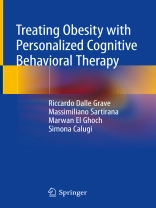This book describes a novel therapy for obesity that associates the traditional procedures of weight-loss lifestyle modification with specific, individualized cognitive behavioral procedures to address some obstacles that have been indicated by recent research to influence weight loss and maintenance.
The Cognitive Behavioral Therapy for Obesity (CBT-OB) can be used to treat all classes of obesity, including patients with severe comorbidities and disability associated with obesity, who are not usually included in traditional weight-loss lifestyle modification treatments.
The book describes the treatment program in detail, and with numerous clinical vignettes. It also discusses involving significant others in the change process and adapting the CBT-OB for patients with severe obesity, binge-eating disorder, medical and psychiatric comorbidity, and treated with weight-loss drugs or bariatric surgery. Lastly, a chapter is dedicated to the use of digital technology with CBT-OB in order to help patients monitor their food intake and physical activity and to addressing obstacles in real time.
Thanks to the description of how to apply the latest, evidence-based CBT-OB to real world settings, this volume is a valuable useful tool for all specialists – endocrinologists, nutritionists, dietitians, psychologists, psychiatrists – who deal with obesity and eating disorders.
Jadual kandungan
CBT-OB: an overview.- Assessing and preparing patient for CBT-OB.- Module 1 – Monitoring food intake, physical activity and body weight.- Module 2. Changing eating style .- Module 3. Developing an active lifestyle.- Module 4. Addressing obstacles to weight loss.- Module 5. Addressing weight-loss and primary goals.- Module 6. Addressing obstacles to weight maintenance.- Family (or significant others) involvement.- Adaptations for intensive levels of care.- Adaptations for patients with binge-eating disorders.- Combining CBT-OB with drugs and bariatric surgery.- CBT-OB and digital technology.- Appendix: The Monitoring Record.- The individualized Formulation.- The Weight-Loss Obstacles Questionnaire.- The Weight-Maintenance Obstacles Questionnaire.
Mengenai Pengarang
Riccardo Dalle Grave MD is the Director of the Department of Eating and Weight Disorders, Villa Garda Hospital and of the master in treatment and prevention of obesity and eating disorders organized by the Italian Association of Eating and Weight Disorders (AIDAP). He is regularly invited to conduct public workshops on the nature and treatment of obesity and eating disorders in Italy, Europe, and the U.S. He supervises several units and clinical services in Europe, US, and Middle East, and teaches at several Italian schools of psychotherapy. He has published 130 papers in peer-reviewed journals included in Pub Med, about 100 papers and 25 books in Italian, two books in the U.S., and several chapters in books on eating disorders and obesity. He is member of the editorial board of International Journal of Eating Disorders, European Eating Disorder Review and Eating and Weight Disorders, senior editor of the Journal of Eating Disorders and editor of the journal Emozioni e Cibo. He is fellow of Academy for Eating Disorder, past-president of AIDAP and past treasurer of Italian Society of Obesity (SIO).
Massimiliano Sartirana Psy D, is a psychologist and has extensive clinical experience in the treatment of eating disorders and obesity. He teaches in several Italian schools of psychotherapy, and co-authored two books in Italian
Marwan El Ghoch MD, is medical doctor specialized in clinical nutrition and has published 60 papers in international peer-reviewed journals included in Pub Med
Simona Calugi, Ph D is a psychologist with a master’s degree in bio-statistics and a Ph D in medicine and public health. She has published 115 papers in international peer-reviewed journals included in Pub Med, and co-authored two books in Italian.












